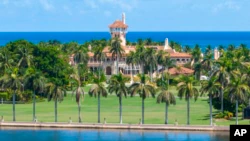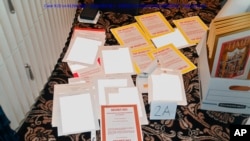Lawyers for the U.S. Justice Department and former President Donald Trump are due to appear at a hearing Thursday as a federal judge considers whether to appoint a special master to review materials the FBI seized from Trump’s Florida home.
U.S. District Judge Aileen Cannon said last weekend she was inclined to appoint a special master but first wanted to hear what the government had to say. While opposing the appointment of a special master, the government said that if Cannon appoints such a person, the review should be completed by Sept. 30.
Trump’s lawyers have asked that any documents that he might be entitled to keep be returned to him, such as material related to conversations he has had with his attorneys about the several investigations of his presidency, the 2020 election, and business affairs that have been undertaken by the Justice Department, officials in New York and the southern state of Georgia.
The government said earlier this week that its review turned up “a limited set of materials” that should be given back to Trump.
Justice Department lawyers said in a late Tuesday filing, “The appointment of a special master would impede the government’s ongoing criminal investigation” into whether Trump obstructed justice or violated other U.S. laws in storing the documents at his Mar-a-Lago estate.
Justice also said that if the special master reviewed classified documents, it “would impede the [U.S.] intelligence community from conducting its ongoing review of the national security risk that improper storage of these highly sensitive materials may have caused and from identifying measures to rectify or mitigate any damage that improper storage caused.”
August search
Trump’s lawyers said in a Wednesday filing that the government’s Aug. 8 search of Trump’s estate was “unprecedented, unnecessary, and legally unsupported.”
They added that what agents found “was to be fully anticipated” and that “the notion that Presidential records would contain sensitive information should have never been cause for alarm.”
The Justice Department said in its Tuesday filing that it only sought and won court approval for an unprecedented search for highly classified national security documents at Trump’s estate after it concluded that “efforts were likely taken to obstruct the government’s investigation.”
The unannounced search came after one of Trump’s lawyers said in June that all classified documents had been returned to the National Archives, as required by U.S. law once a president leaves office.
Trump aides turned over 15 boxes with 184 classified documents to the Archives in January and 38 more such documents in June.
The Justice Department, however, said the Trump lawyer who asserted that everything had been turned over “explicitly prohibited government personnel from opening or looking inside any of the boxes that remained in the storage room [at Mar-a-Lago], giving no opportunity for the government to confirm that no documents with classification markings remained.”
Subsequently, the Justice Department said, “The government developed evidence that a search limited to the storage room would not have uncovered all the classified documents” at the former president’s oceanside retreat.
Suspecting more classified documents remained at Mar-a-Lago, Attorney General Merrick Garland authorized the unprecedented search of the former president’s residence and won approval for the search from U.S. Magistrate Judge Bruce Reinhart in Florida.
The Justice Department said that, during the early August search, FBI agents seized another 33 boxes, containers and other evidence with more than 100 classified records, including some marked with the highest national security classifications.
The 36-page court filing included a photograph of some of the classified documents found in Trump’s office, which had been spread out on the carpet for the photo. The Justice Department filing said that some of the documents were so highly classified that lawyers later reading them had to obtain additional security clearances before they could review the materials.
In a social media post Wednesday, Trump said, “Terrible the way the FBI, during the Raid of Mar-a-Lago threw documents haphazardly all over the floor (perhaps pretending it was me that did it!), and then started taking pictures of them for the public to see.”
Trump again claimed he had declassified the documents, although he has not produced any evidence that he did so before leaving office when his authority to do that expired.


